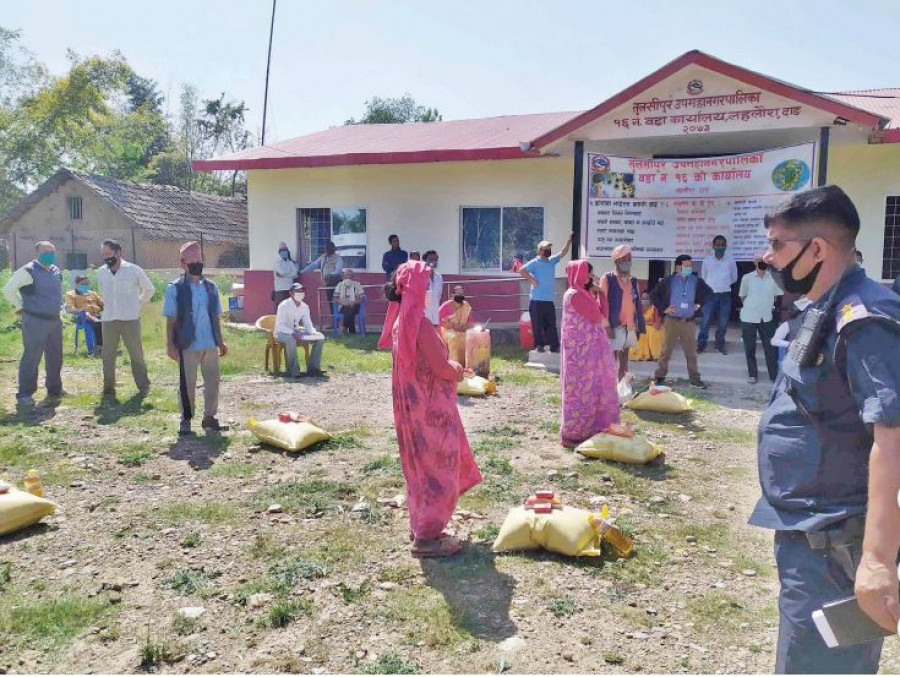National
Municipalities seek government funds to provide essentials to families affected by Covid-19 lockdown
Municipal Association of Nepal have also asked provincial and federal governments funds to continue their relief distribution programmes.
Prithvi Man Shrestha
Officials at the Kathmandu Metropolitan City had estimated that they may have to distribute daily essentials to a maximum of 20,000 families severely affected by the nationwide lockdown to contain the spread of Covid-19,
But when distribution began, they ended up providing packages that contain rice, pulses, salt, cooking oil, soap and sugar to around 55,000 families. The list of households is still growing.
“An additional 25,000 families have sought relief packages,” said Ishwor Man Dangol, spokesperson for the city. But the city, which is using emergency funds to finance the programme, does not have the money to distribute essentials to all the families that have requested aid.
“We are distributing relief using money from the Rs 100 million Covid-19 emergency fund. I don’t think we can afford a second round of relief distribution without the federal government’s support,” said Dangol.
The government on March 29, four days after the nationwide lockdown came into force, announced that local governments shall provide essentials to daily waged workers and destitutes. The local governments were supposed to finance the programme by mobilising their savings and funds received from federal and provincial governments allocated for projects of least priority.
Like Kathmandu Metropolitan City, many other local governments are also overwhelmed by the demand for aid and are seeking additional funds from the centre.
As the fate of the lockdown remains uncertain amid rising cases of Covid-19, officials say they might have to continue providing essentials to the needy.
Lalitpur Metropolitan City has distributed essentials to around 19,000 families by spending over Rs 20 million so far. The city, which established a Covid-19 fund of Rs 50 million to procure rapid test kits and medical equipment and make provisions for quarantine facilities, says it cannot provide relief to more families as it also needs to spend on the city’s bid to fight the disease.
“Considering the expenses incurred for relief packages and fight against Covid-19, the federal and provincial governments will have to provide us funds to continue distributing relief packages to the needy,” said Raju Maharjan, spokesperson for the city.
According to him, there is growing pressure from the local people, who have their own homes, to provide relief for them as their income suffers due to lockdown. “During the first phase, 80 percent of beneficiaries are those who are staying in rent,” said Maharjan. “We may be forced to compromise with local people in the second phase.”
Amid growing demand for government aid, a recent meeting of the Kathmandu Valley Mayors’ Forum, a grouping of chiefs of municipalities in the Valley, decided to seek resources from the central government to continue the distribution of aid.
Municipal Association of Nepal, a grouping of municipalities and National Association of Rural Municipalities in Nepal, a grouping of rural municipalities, have also asked provincial and federal governments funds to continue their relief distribution programmes.
Ashok Kumar Byanju, president of the municipal association, said his office wrote to the all seven provincial governments and the central government last week to facilitate the establishment of quarantines and distribution of aid packages.
Likewise, the rural municipality association on Tuesday urged the federal government to provide money for the Covid-19 fund created by rural municipalities.
“We urge the federal government to make necessary arrangements of resources as the Covid-19 fund is facing increased liabilities,” the association said in a statement.




 18.12°C Kathmandu
18.12°C Kathmandu














